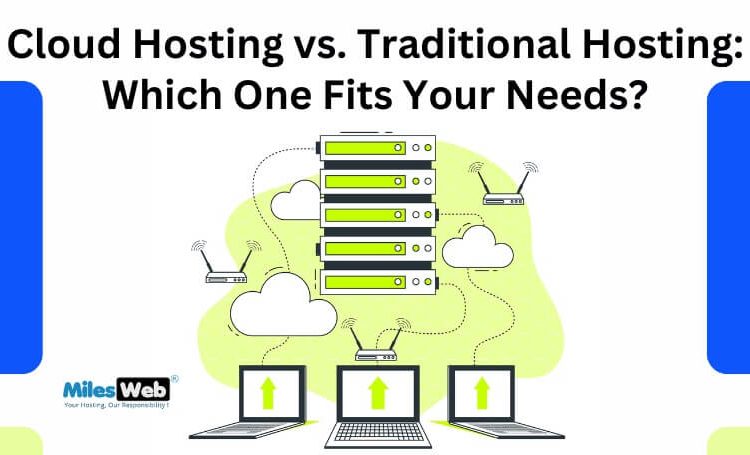Cloud Hosting vs. Traditional Hosting: Which One Fits Your Needs?

Websites have become a necessity for businesses in this digital era. Therefore, the demand for web hosting services has also increased. It is because every website needs a server space to build its online presence and maintain the accessibility of websites. Among the different types of web hosting plans, cheapest cloud web hosting and managed web hosting services are two major hosting options.
Choosing one among them would be a challenging task but this guide explores the differences between these two options that help you determine the right option whether to buy cloud hosting or others for your business.
What is Traditional Hosting?
Shared Hosting
Shared hosting is a common web hosting option for budget-friendly clients. Those who want to start their website with a moderate traffic level may opt for it. In this, the server resources like CPU, RAM, and disk spaces are shared among different clients. As a result, the resource consumption is higher which could lead to slower load times for your site – a factor known as the “bad neighbor effect.”
VPS Hosting
Virtual Private Server (VPS) hosting is a popular kind of traditional web hosting that provides users with the benefit of dedicated server resources. In this, there are different virtual servers deployed under a single physical server. The solution builds an ideal balance between affordability and resource allocation for businesses experiencing consistent growth or those looking for more control over the website environment. Companies that use VPS hosting can benefit from more data isolation than shared hosting environments can provide, all while managing their custom configurations, which can be easily installed.
Dedicated Hosting
Dedicated servers are a popular choice for businesses and individuals seeking complete server control over their hosting environment. Unlike shared or VPS hosting servers, dedicated servers allocate more resources to a single client eliminating the concerns of poor performance or security risks. One major advantage of dedicated hosting is to have the ability to handle high-traffic websites and resource-intensive applications efficiently. Additionally, as your site grows in popularity or complexity, you can effortlessly upgrade your server hardware (CPU, RAM, SSD storage) without reconfiguring the entire system.
What Is Cloud Hosting?
A cloud hosting service uses multiple interconnected servers to store and retrieve data, providing better reliability, scalability, and flexibility than traditional web hosting.
An unlimited shared resource public cloud hosting model. A cloud is a network of servers that allows multiple users to share resources. For small businesses and startups with limited budgets, public cloud services from providers like AWS and Google Cloud Platform are ideal. Cloud IT infrastructures are characterized by their scalability since they offer virtually unlimited resources. A powerful tool like SSD storage, CDN (Content Delivery Network), DDoS protection, and security features like firewalls and encryption are also provided with public clouds.
Cloud Hosting vs. Traditional Hosting: Key Differences
Customization
Compared to traditional hosting, cloud hosting allows for greater infrastructure customization. Using cloud hosting, users can access various resources tailored to their needs. Based on traffic patterns and future growth projections, it includes adjusting server performance, storage capacity, and network availability. Due to the constraints of running a website on a single server in one location with shared resources, traditional hosting has limited customization options.
Infrastructure Resilience
Traditional hosting solutions do not offer infrastructure resilience, which is one of the key differences between cloud hosting and traditional hosting solutions. Cloud hosting comes up with a resilient web hosting infrastructure by storing data on multiple servers. It allows quick server boot-up on other hardware in case of an accident.
It means if there is a problem with one server, the website or application functions without disruption. In contrast, traditional hosting prioritizes resource sharing, ensuring resources are available for all customers sharing the same resources.
Summing Up
Choosing between cloud hosting and traditional hosting depends on your specific website needs and budget. Cloud hosting offers superior scalability, security, and flexibility, making it ideal for growing businesses and websites with fluctuating traffic. However, traditional hosting can be a cost-effective option for smaller websites with consistent traffic levels and less technical expertise.
Here’s a quick recap to help you decide:
Cloud Hosting: Ideal for scalability, security, and flexibility. Good for growing businesses and websites with fluctuating traffic.
Traditional Hosting: More affordable for basic websites with consistent traffic. Requires some technical knowledge for server management.
No matter which option you choose, carefully research different providers and plans to find the best fit for your website.
